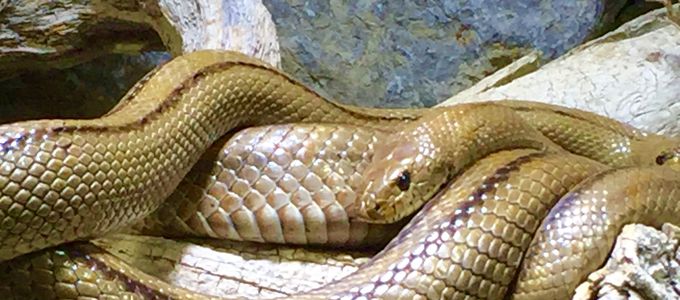
Have you ever been bitten by a snake? Better be careful. Snakes can be poisonous. There is a story in the Bible about this. It starts with the Israelites complaining about their food: the same food every day—who fancies that?
What they were talking about was manna, the bread from heaven, but the Bible describes it completely different: it was white and its taste was like that of honey. But even so, eventually you become fed up. And then the people started to really complain. Although they had just escaped slavery in Egypt they wanted to go back there. Their opposition hurt Moses. “Why have you brought us up out of Egypt to die in the wilderness? For there is no food and no water, and our soul loathes this worthless bread” (Numbers 21: 5–6). Their aversion to it could not have been greater.
But the people’s revolt did not only hurt Moses, it also hurt the One who provided this bread from heaven: God Himself! Their open rebellion resulted in a plague of fiery serpents. Many Israelites were bitten and died. The people quickly recognized that they had violated God’s orders. Moses pleaded with God to help them. But God did not just simply stop the plague. Instead He had Moses fashion a bronze serpent and put it on a pole. God explained that anyone who had been bitten and looked at the bronze serpent would live.
The exalted sign as an antidote
The bronze serpent as an antidote. This is something we also encounter in other cultures. The worship of serpent deities was something that was known by the Romans, the Greeks, and the Germanic peoples. King Hezekiah, a wise king in Jerusalem, instituted a religious reform during his reign and had the temple cleansed of all religious icons. He also had the bronze serpent destroyed that Moses had once made. It had apparently been venerated idolatrously as a religious symbol with healing power—similar to the staff of Asclepius in Greek mythology.
Jesus as an exalted sign
Actually, this story of the bronze serpent would just be one biblical story of many if Jesus Christ had not related it to Himself. We can read more about this in John. While Jesus was speaking to Nicodemus one night, He also came to speak about His exaltation as the Messiah. The Son of Man would have to be lifted up just as Moses had lifted up the serpent in the desert so that all who believe in Jesus might have eternal life (John 3: 14–15). He could not have chosen a better comparison. Nicodemus, of course, was familiar with the story of the bronze serpent.
And now to us. Just as the people then were given life by looking up to the serpent, so our faith in Jesus Christ is to accord us eternal life. His sacrifice and crucifixion not only signify deepest humiliation, but healing exaltation. Just as God granted life to those who looked up to the serpent that had been lifted up, so Jesus promises eternal life to anyone who looks up to Him in faith.
The requirement is faith
What does this tell us today? The following is clear: God expected faith from the people at the time. He did not simply cause the snakes to disappear but made an offer of salvation. This required faith. Jesus Christ, who grants eternal life, likewise demands faith: “He who believes in Me, though he may die, he shall live” (John 11: 25).




